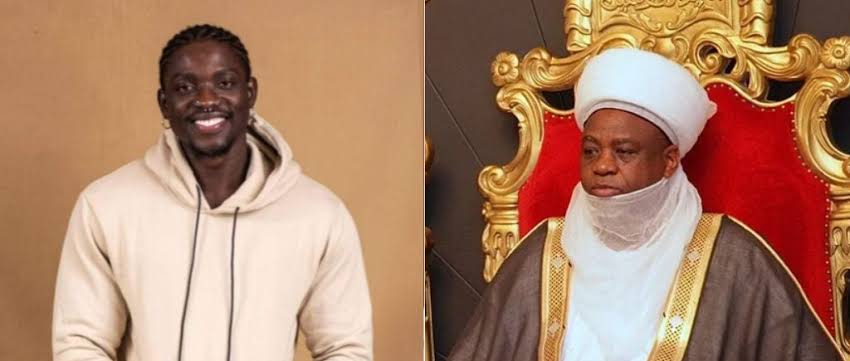
"Kneel Before Wike and Beg Him": Former Governorship Candidate Eradiri Sends Strong Message to Fubara

In a politically charged statement that has sent ripples across the Nigerian political landscape, former governorship candidate, Eradiri, has openly called on the current Governor of Rivers State, Siminalayi Fubara, to “kneel before Wike and beg him” for forgiveness. This fiery remark has sparked widespread debate, as it appears to reignite the ongoing political tensions between Fubara and his predecessor, Nyesom Wike, whose influence over the state’s political scene remains formidable.
The comment, made by Eradiri, who was a key figure in the 2023 Rivers State governorship election, is more than just a critique of Fubara’s leadership; it represents the simmering resentment and political divisions that have characterized Rivers State politics since Wike's tenure as governor. Wike, a highly influential and controversial figure, had a lasting impact on the state’s political fabric, and his departure from the office left behind a legacy that continues to influence both his supporters and detractors.
Eradiri's statement is particularly significant considering the complex relationship between Wike and Fubara. Fubara, a member of the same political party, the People’s Democratic Party (PDP), succeeded Wike after winning the 2023 governorship election, but it has been widely acknowledged that Wike’s influence remains a potent force in the state’s political landscape. However, since Fubara’s assumption of office, there has been growing speculation that the new governor is attempting to carve out his own path, distancing himself from Wike’s shadow and establishing his own authority. This shift has led to an undercurrent of tension within the party, with some figures, like Eradiri, suggesting that Fubara has not done enough to honor Wike’s legacy or maintain the political harmony that existed during Wike’s time in office.
The remark, “kneel before Wike and beg him,” which Eradiri made in a public interview, was directed at Fubara and seemed to be a call for the current governor to humble himself and seek Wike’s support or forgiveness. This statement has not only drawn attention to the ongoing rivalry between Fubara and Wike but also to the broader issues of political loyalty, power dynamics, and the struggle for influence in Rivers State. The use of the word “kneel” carries a strong connotation of submission and deference, which some critics argue undermines the authority of the current governor while elevating the status of the former governor.
Eradiri’s comments have sparked a flurry of reactions from both political allies and critics of Fubara. Supporters of the governor have dismissed the call as an unnecessary and divisive attack, arguing that Fubara is his own man and should not be subjected to the whims of his predecessor. They point to Fubara’s election as a clear mandate from the people of Rivers State, suggesting that he has the authority to govern without needing to seek Wike’s approval or validation. These supporters argue that Fubara’s leadership should be judged on its own merits, rather than being constantly compared to Wike’s tenure.
On the other hand, Wike’s loyalists have largely welcomed Eradiri’s statement, viewing it as an expression of frustration with Fubara’s attempts to distance himself from the former governor. For many of Wike’s supporters, the idea of Fubara seeking reconciliation or endorsement from Wike is seen as a necessary step to ensure political unity within the PDP and to maintain the party’s dominance in Rivers State. They argue that Wike’s leadership was instrumental in securing electoral victories for the PDP, and that any attempt by Fubara to break away from this legacy could weaken the party’s grip on power.
Eradiri’s statement is also seen as a pointed reminder of the power struggle that has often defined Nigerian politics, particularly in the context of state governance. In Rivers State, as in many other parts of the country, political power is often concentrated in the hands of a few individuals who wield significant influence over the direction of governance. Wike’s hold on Rivers politics has been undeniable, with his ability to sway public opinion and control party dynamics making him a dominant figure in the state. In this light, Eradiri’s comment suggests that Fubara’s political survival and success may depend on his ability to manage his relationship with Wike, whose support could be crucial in maintaining stability within the party.
The comment also underscores the complex nature of Nigerian politics, where allegiances are often fluid and personal relationships can make or break a political career. Fubara’s efforts to establish his own identity as governor may be complicated by the shadow of Wike, whose influence still looms large. This dynamic creates a delicate balancing act for Fubara, who must navigate the expectations of both his own supporters and those loyal to Wike. The idea of "kneeling" before Wike, as Eradiri suggests, implies a level of submission to the former governor’s authority and political legacy, but it also highlights the power that Wike continues to hold in the state.
While Eradiri’s statement has generated significant attention, it is also part of a broader trend of public criticism of Fubara’s leadership. Some political observers have raised concerns about Fubara’s ability to effectively govern without the strong backing of Wike and his political network. These critics argue that Fubara’s attempts to assert independence could lead to factionalism within the PDP in Rivers State, with factions loyal to Wike potentially clashing with those who support the current governor.
In response to Eradiri’s remarks, Fubara’s supporters have largely dismissed the idea of him seeking reconciliation with Wike in such a submissive manner. They argue that the governor should be allowed to lead without undue interference from external forces, including political figures from the past. This view reflects a broader sentiment among some Nigerians that politicians should be held accountable for their own actions and decisions, rather than being overly reliant on the influence of their predecessors.
As the political tensions in Rivers State continue to simmer, Eradiri’s call for Fubara to “kneel before Wike” serves as a powerful reminder of the complex power dynamics that shape Nigerian politics. The fate of the state’s political landscape may well depend on how Fubara navigates his relationship with Wike, whose shadow continues to loom over the political scene. Whether or not Fubara chooses to heed Eradiri’s advice remains to be seen, but one thing is clear: the struggle for political supremacy in Rivers State is far from over, and the path forward will require careful negotiation and strategic alliances.


